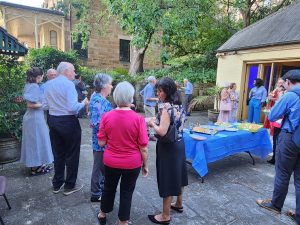Space Activities: Challenges to Safety and Security
On Tuesday 5 December 2023, Steven Freeland, Emeritus Professor of International Law at Western Sydney University, addressed the Institute on the challenges facing the future governance of space activities.
Steven began his address with a thought-provoking claim: that everyone in the room was using space at least thirty times a day, for anything from financial transactions and weather forecasting to navigation and personal communications, all relying on satellites. While there is a tendency to view space as futuristic, its primary role in our critical infrastructure suggests it is both mainstream and contemporary, with every person on the planet touched by space in some way. Without space, Steven remarked, we would be ‘back in the dark ages’.
He continued that space is not a lawless frontier: it is regulated by forms of law that date back to the launch of Sputnik I in 1957. At that point in time, and in the context of the Cold War, states needed a way to delimit sovereignty in outer space, with the international community realising almost immediately that it extended beyond national jurisdiction. Similar considerations had guided the development of the law of the sea and the administration of Antarctica.
Australia was one of the 18 founding members in 1959 of the UN Committee on the Peaceful Uses of Outer Space (UNCOPUOS) and remained one of the most active. As an international law expert and Australian Government representative on UNCOPUOS, Steven has been closely involved in the development and negotiation of international space law. Throughout the 60s and 70s, the UN worked to develop a series of treaties designed to ensure the peaceful exploration and use of space. Though national activities in space had steadily intensified in the decades since, Steven suggested that these treaties still serve us well in the international context, with the proliferation of national space law contributing to a robust body of regulatory principles.
During his talk, Steven frequently returned to the idea that the future of humanity depends on how we interact with space. These interactions will be shaped by several challenges at the level of international governance. Steven focussed specifically on the following six:
- Listening to all voices in the multidisciplinary realm of space.
- Addressing the inaccurate dichotomy of space as either peaceful or militaristic.
- Achieving consensus on space in a complex and diverse world.
- Resolving, or at least trying to resolve, the delimitation/definition of space.
- Adapting to the commercialisation of space.
- Addressing the huge and growing problem of space debris.
Steven suggested that the true challenge of space regulation lies in the need for a whole-of-government approach, which will be difficult to achieve so long as funds and public interest are lacking. But he remained optimistic about the future, recognising a common interest among countries big and small not to push their own interests too far in space, for fear that they may bring everyone down. Rather, richly-resourced countries must be prepared to work in the wider interest to make space safe, secure and productive for all.
Asked about the future of deep space exploration and the capabilities of the private sector in this area, Steven remarked that private actors are capable of developing more advanced technology than national space agencies but the public sector has an important role to play in regulating private individuals in line with international treaties. The US, for example, must lean on existing legal frameworks to mitigate the risks arising with the activities of companies like Space X.
Asked about the looming dangers of nuclear testing in space, his response was that this activity falls beyond the remit of UNCOPUOS; it needed to be addressed by such bodies as the UN Committee for Disarmament.
On the implications of recent budget cuts to the Australian Space Agency, Steven reminded the audience that the industry is vulnerable to the three-year electoral cycle, with space being a hard sell for governments on the campaign trail. In the wake of budget cuts, the Agency must strive to lead with the tools it has, continually prioritising and adapting its expectations to what it can realistically achieve.
A full copy of Steven’s slides is available – contact nswexec@internationalaffairs.org.au
Report by Imogen Biggins, AIIA NSW Intern

Members enjoy seasonal refreshments at end-of-year event addressed by Professor Steven Freeland